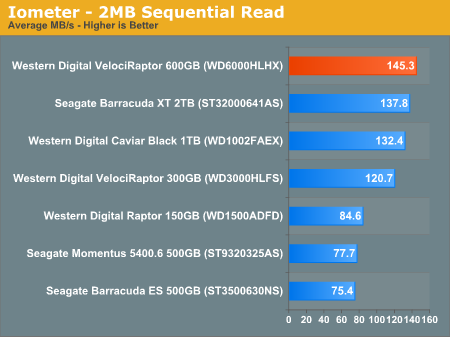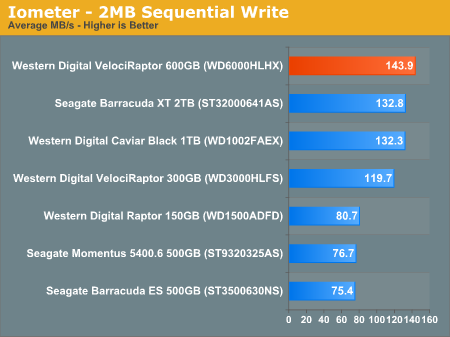Western Digital's New VelociRaptor VR200M: 10K RPM at 450GB and 600GB
by Anand Lal Shimpi on April 6, 2010 8:00 AM EST- Posted in
- Storage
Sequential Read/Write Speed
Using the latest build of Iometer I ran a 3 minute long 2MB sequential test over the entire span of the drive. The results reported are in average MB/s over the entire test length:

This chart shows us Western Digital's problem. Prior to the VR200M series, high end current generation 1TB and 2TB drives were faster than the VelociRaptor. While it still had lower access times, the higher platter density of these newer TB drives gave them a measurable advantage in sequential write speed.
The new 600GB VelociRaptor restores balance to the force and outpaces the old one by 20%. Newer drives are still behind, but the VR advantage is between 5 - 10%.

Unlike SSDs, hard drives have fairly symmetrical read/write performance. There are no changes here. Note that in terms of sequential performance, a 5400RPM notebook drive is roughly as fast as the old 150GB Raptor from 2006.










77 Comments
View All Comments
pjconoso - Tuesday, April 6, 2010 - link
The heatsink is quite massive for such a small hard drive. How hot do these things run? The price is very tempting considering that SSDs are VEEERRYY expensive here in our country (Philippines) but if I'm coming from the regulard Caviar Black and considered something like this, would it be worth it?Goty - Tuesday, April 6, 2010 - link
It's not that the drive runs hot, it's that it's a 2.5" unit and therefore doesn't fit well in most desktop cases. I can't remember where, but I remember some tests that were done not too long ago comparing temps with and without the heatsink and there was little difference.nurd - Tuesday, April 6, 2010 - link
Just so. If you actually hold them (well, the 300's at least, and I'm assuming these aren't much different), you'll note that there really isn't a lot of tight contact area for heat to be sunk into it. It's just a carrier; the "heatsink" look is cosmetic.pjconoso - Tuesday, April 6, 2010 - link
In my opinion, they should've opted for the cheap bracket support for mounting this thing as a 3.5-inch hard drive rather than upping the cost because of the heatsink - that would've brought the prices down a bit, don't you think?HillBeast - Wednesday, April 7, 2010 - link
The thing is though, this drive is designed to be in servers and the like and is designed to handle 24/7 operation so if they just opted for a cheap bracket then it will most likely get VERY hot and would probably seize. I have seen this happen to a Seagate once. Any cooling is better than none and I'd rather pay for quality goods.sxr7171 - Wednesday, April 7, 2010 - link
What part of "there wasn't any difference in drive temperature" or "theheatsink" is purely cosmetic did you not understand?
HillBeast - Wednesday, April 7, 2010 - link
What part of any cooling is better than none did you not understand? What part of running these puppies 24/7 in a server with several stacked upon each other whre they will get almost no ventilation and ANY cooling would be better than a crappy metal brack do you not understand?Calin - Thursday, April 8, 2010 - link
In a server they'll probably stay in 2.5 inch enclosures (and for OEM, they'll probably bought without the plate extender). As for heat, they're the the coolest of the test (including 3.5" magnetic hard drives)beachlife - Tuesday, August 3, 2010 - link
Do you have that test result?http://www.wdc.com/en/products/products.asp?DriveI...
I find it interesting that the VelociRaptor drive with the Ice Pack Heat sink and one without (WD4500HLHX vs. WD4500BLHX) BOTH have the same Operating temp, 0-55, not sure how this is possible, our testing does not confirm this
Imperceptible - Tuesday, April 6, 2010 - link
I would have liked to see the 2TB variant of the WD Black series used for the sake of comparison, considering that's currently the fastest mechanical drive (apart from these new raptors).